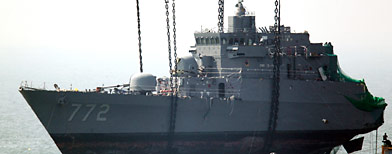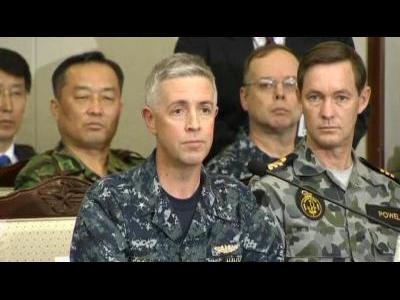SEOUL, South Korea – North Korea said Thursday that South Koreafabricated evidence implicating the North in a torpedo attack in order to pick on the North and any attempt at retaliating for the warship's sinking would be answered with "all-out war."
South Korean President Lee Myung-bak vowed "stern action" for the attack after a multinational investigation issued its long-awaited results Thursday, concluding the North fired a torpedo that sank the Cheonan navy ship March 26 near the Koreas' tense sea border.
"If the (South Korean) enemies try to deal any retaliation or punishment, or if they try sanctions or a strike on us .... we will answer to this with all-out war," Col. Pak In Ho of North Korea's navy told broadcaster APTN in an exclusive interview in Pyongyang.
An international civilian-military investigation team said evidence overwhelmingly proves a North Korean submarine fired a homing torpedo that caused a massive underwater blast that tore the Cheonan apart. Fifty-eight sailors were rescued from the frigid Yellow Sea, but 46 perished in the South's worst military disaster since the Korean War.
Since the 1950-53 war on the Korean peninsula ended in a truce rather than a peace treaty, the Koreas remain locked in a state of war and divided by the world's most heavily armed border.
The truce prevents Seoul from waging a unilateral military attack.
However, South Korea and the U.S., which has 28,500 troops on the peninsula, could hold joint military exercises in a show of force, said Daniel Pinkston, a Seoul-based analyst for the International Crisis Group think tank.
South Korean and U.S. officials also said they are considering a variety of options in response to the warship's sinking, ranging from U.N. Security Council action to additional U.S. penalties.
The exchange of war rhetoric raised tensions, but the isolated communist regime — already under international pressure to cease its nuclear weapons program — often warns of dire consequences against South Korea or Washington for any punitive steps against it. Its large but decrepit military would be no match for U.S. and Korean forces.
The impoverished country is already chafing from international sanctions tightened last year in the wake of widely condemned nuclear and missile tests. U.N. sanctions currently block funding to certain officials and companies, while North Korea is barred from exporting weapons and countries are authorized to inspect North Korean ships suspected of carrying illicit cargo.
South Korea "will take resolute countermeasures against North Korea and make it admit its wrongdoings through strong international cooperation," Lee said during a call with Australian Prime Minister Kevin Rudd, the presidential office said. Lee convened an emergency meeting for Friday.
The White House called the sinking an unacceptable "act of aggression" that violates international law and the 1953 truce. Japanese Prime Minister Yukio Hatoyama declared his support for South Korea, calling North Korea's actions "inexcusable."
China, North Korea's traditional ally, called the sinking of the naval ship "unfortunate" but stopped short of backing Seoul.
Pyongyang continued its steadfast denials of involvement in the sinking.
"Our Korean People's Army was not founded for the purpose of attacking others. We have no intention to strike others first," Col. Pak, the naval spokesman, told APTN in the North Korean capital. "So why should we attack a ship like the Cheonan which has no relation with us, no need to strike it and we have no significance in doing so."
North Korea has waged a slew of attacks on South Korea since the 1950-53 fighting ended, including the 1987 downing of a South Korean airliner that killed all 115 people on board.
Pyongyang has never owned up to the attacks.
North Korea also disputes the maritime border drawn unilaterally by U.N. forces at the close of the Korean War, and the waters have been the site of several deadly naval clashes.
Detailed scientific analysis of the wreckage, as well as fragments recovered from the waters where the Cheonan went down, point to North Korea, investigators said.
The bending of the ship's keel backs the theory that an underwater torpedo triggered a shockwave and bubble effect that tore the ship apart, the report said.
The report also cites fractures on the main deck, statements from survivors and a sentry on a nearby island, and fractures and lacerations on the remains of deceased sailors.
Pieces of the torpedo "perfectly match" the schematics of a North Korean-made torpedo Pyongyang has tried to sell abroad, chief investigator Yoon Duk-yong said.
A serial number on one fragment is consistent with markings from a North Korean torpedo that Seoul obtained years earlier, Yoon said.
"The evidence points overwhelmingly to the conclusion that the torpedo was fired by a North Korean submarine," he said. "There is no other plausible explanation."
At Seoul's main train station, scores of people watched raptly as the investigator laid out the evidence against North Korea.
"I'm afraid," said Naima Vela, 26-year-old student from Italy. "I still have a month or two to stay in Seoul and I don't know if I should."
Near the Demilitarized Zone, tourists peered across the border into North Korea.
"As a mother of a boy who is serving his military duty right now, I don't want a war to break out," Jeon Bok-soon said in Paju as she looked across the border into North Korea.
"However if (North Korea) keeps mentioning war, I think we should also show our strong military power," she said.
___
Associated Press writers Matthew Lee in Washington, Jay Alabaster in Tokyo, Kelly Olsen and Claire Lee in Seoul, and Chi-Chi Zhang in Beijing contributed to this report.
http://news.yahoo.com/s/ap/20100520/ap_on_re_as/as_skorea_ship_sinks






Tidak ada komentar:
Posting Komentar